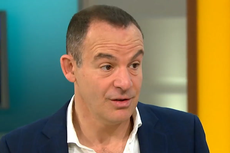More than 10 million UK adults struggling with bills and credit repayments
Number admitting to struggle grows by 3 million in one year

More than 10 million adults in the UK are currently struggling with bills with some eating less and cancelling insurance policies in order to get by, a study has shown.
The Financial Conduct Authority (FCA) found the number in financial trouble has grown by 3.1 million since May 2022 to now represent one in five of the population.
The regulatory body spoke to people in their survey who had been forced to take measures such as using savings to fill an oil tank, using credit to pay for food shopping, cancelling insurance, quitting sports memberships and eating less.
The FCA research, which was published this week, found the number to have said they are struggling has risen from 7.8 million in May last year to 10.9 million in January 2023 - which is 21 per cent of the UK population.
The number of UK adults who had missed bills or loan payments in at least three of the previous six months is also estimated by the regulator to have increased by 1.4 million, from 4.2 million in May 2022 to 5.6 million in January 2023.
The regulator released the latest figures after gathering more than 5,000 responses as part of its UK-wide survey of people aged 18 and over.
Among people who had insurance and protection policies last spring, 8 per cent had cancelled one or more policies and 7 per cent had reduced their level of cover, specifically to save money due to rising living costs, in the six months to January this year.
Some did both – meaning that around 6.2 million adults who had policies in May 2022 had cancelled or reduced their coverage by January.

Richard Lane, director of external affairs at British debt charity StepChange, said: “The last twelve months have seen household budgets endure setback after setback, with once-in-a-generation levels of inflation compounded by rising interest rates and housing costs.
“Millions have had to make sacrifices to stay afloat, but many simply do not have the room in their budgets to absorb the dramatic price rises we’ve seen. As a result, demand for our services is at its highest level in more than three years, and we expect this to continue as cost pressures show little sign of abating.”
The FCA also found that around 28.4 million people in January 2023 felt more anxious or stressed due to the rising cost of living than six months earlier while 28 per cent had lost sleep.
The regulator is reminding borrowers that they can get help from their lenders if they are struggling to keep up with payments.
“Our research highlights the real impact the rising cost of living is having on people’s ability to keep up with their bills.”
Sheldon Mills, executive director of consumers and competition at the FCA, said: “Our research highlights the real impact the rising cost of living is having on people’s ability to keep up with their bills.
“If you’re concerned about your finances, you do not need to worry alone. We’ve told lenders that they should provide support tailored to your needs.
“And, if you find yourself in debt or want to know more about how to manage your finances, free expert advice is available.”
The FCA will be introducing a new consumer duty in the summer. The duty will require firms to act to deliver good outcomes for consumers and make sure that they are properly supported while using a financial product or service.

Matt Copeland, National Energy Action (NEA) head of policy, said: “Millions of households have suffered almost two years of spending huge proportions of their income just on energy as the crisis drags on. There are currently 7.5 million households in fuel poverty.
“Households have seen their finances eroded by the staggering cost of essentials, with many low-income households in extremely precarious financial situations, even during the time of year when we use our heating least. Energy debt is a growing problem and one that is set to make next winter another very tough one for millions of households.
“Energy bills estimated to fall to £2,000 a year on average in July still means unaffordability for so many. The government must provide more support for bills and commit funds to energy efficiency.”
Jane Tully, director of external affairs and partnerships at the Money Advice Trust, the charity that runs National Debtline and Business Debtline, said: “Sustained high costs and rising interest rates are creating a perfect storm, putting pressure on many household budgets.
“As incomes struggle to keep up with rising prices, our advisers are hearing from callers who are skipping meals and unable to afford other essentials with many already behind on bills like energy and council tax.
“As household budgets are stretched to their limits, many people are left with little option but to rely on credit to plug the gaps in their finances.”
Join our commenting forum
Join thought-provoking conversations, follow other Independent readers and see their replies
Comments


Bookmark popover
Removed from bookmarks